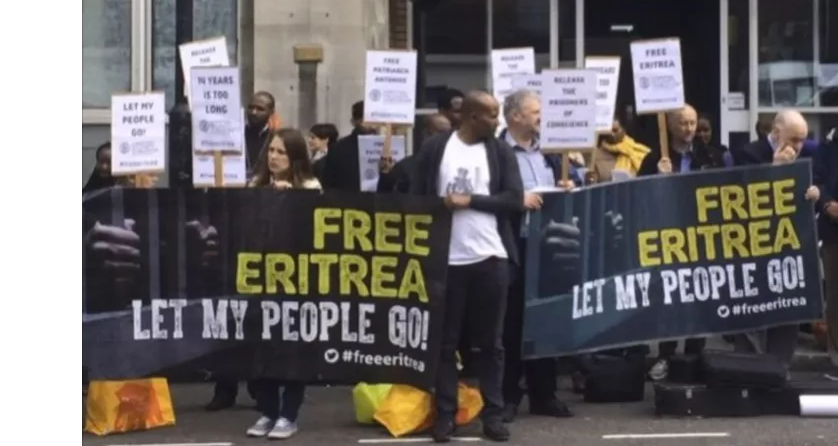Several international human rights organizations, including the U.K.-based Christian Solidarity Worldwide, convened a protest vigil outside the Eritrean Embassy in London, marking the 20th anniversary of the ongoing detention of senior church leaders in Eritrea.
The vigil, held last Thursday, was significant for being the first in-person protest held at the Eritrean Embassy in London since May 2019. Those gathered sought to draw attention to the Eritrean government’s harsh policies toward religious freedom and to condemn the Eritrean government’s crackdown on non-state sanctioned religious practices.
Since 2003, annual vigils have been organized to commemorate the May 2002 governmental decree that effectively banned religious groups outside of the state-approved denominations of Catholic, Evangelical Lutheran, Orthodox Christianity and Sunni Islam, said CSW, which protested alongside Church In Chains (Ireland), the Eritrean Orthodox Church in the U.K., Human Rights Concern-Eritrea and Release Eritrea.
The policy has led to severe restrictions on the freedom of religion or belief and resulted in widespread arbitrary detentions of adherents from both sanctioned and unsanctioned faiths, CSW said.
“Twenty years is too many,” said Dr. Berhane Asmelash, director of Release Eritrea. “Now the situation in Eritrea is getting worse. In the last month, hundreds of Christians were arrested, taken from their homes at night and imprisoned without committing any crimes.”
Asmelash added, “All of these people have not committed any crimes, but the Eritrean government says: ‘So what? I can do whatever I want.’ No, they cannot do whatever they want because the final word will come from the Lord. We trust and we know change is coming shortly.”
Elsa Chyrum, director of Human Rights Concern-Eritrea, shed light on the plight of Eritrean refugees, who find themselves unsafe across various borders, from Tigray to Sudan and even as far as Egypt and Israel.
“Thousands of Eritreans continue fleeing their country every year — more than from any other African country — fleeing from imprisonment without trial, torture, persecution of beliefs, and, above all, lifetime National Service for every young man or woman over 18 years of age, condemned to endless years in the armed forces or slave labor in government-owned factories, farms, construction sites and mines,” Chyrum said. “To be a refugee from Eritrea is to be one of the most endangered people seeking protection worldwide.”
Khataza Gondwe of CSW described the abuses of the Eritrean regime as one of Africa’s most oppressive: “Enforced disappearances, arbitrary arrest and indefinite and/or incommunicado detention without trial or legitimate charge are rife, and can occur for the most minor reasons. Fundamental rights and freedoms are non-existent; there is no opposition, no independent press, the judiciary is compromised, the national assembly has not met in decades, democratic elections are long overdue and a commendable and ratified constitution with an extensive bill of rights remains unimplemented.”
During the protest, an attempt was made to deliver a letter to the Eritrean Ambassador to the U.K. and Ireland, Estifanos Habtemariam Ghebreyesus. The letter demanded the unconditional release of all prisoners of conscience detained without charge or trial.
The embassy, however, refused to open its doors, leading protesters to post the letter through the embassy’s letterbox.
Earlier in January, tensions involving the Eritrean community escalated in London, as reported by The Times of London.
A clash ensued during a New Year celebration organized by the Eritrean Embassy, involving pro-democracy Eritrean groups and police. The confrontation left an emergency worker hospitalized and resulted in several arrests.
Eritrea, often dubbed the “North Korea of Africa,” is ruled by President Afwerki, who has maintained power since the country’s independence from Ethiopia in 1993. The regime enforces indefinite military service, suppresses dissent and has not held democratic elections.
Courtesy of The Christian Post.

